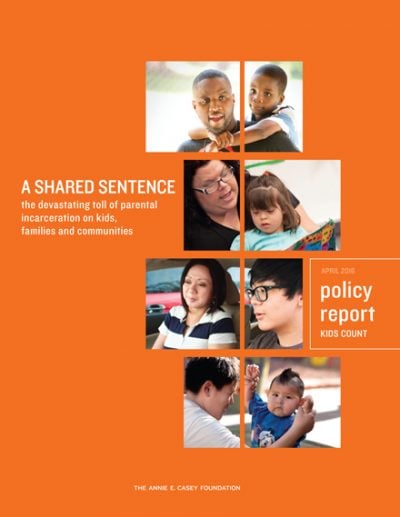Number of Children Who Experience Parental Incarceration
Seven percent of U.S. children have experienced parental incarceration. Among states, the percentage varies dramatically, from only 3% in New Jersey to 13% in Kentucky.

More than 5 million U.S. children have had a parent in jail or prison at some point in their lives. The incarceration of a parent can have as much impact on a child’s well-being as abuse or domestic violence. But while states spend heavily on corrections, few resources exist to support parental incarceration. A Shared Sentence offers commonsense proposals to address the increased poverty and stress that children of incarcerated parents experience.
Parental incarceration is an adverse childhood experience that removes the mother or father from a child's household and everyday life. The removal of a parent due to incarceration is often accompanied by other traumatic stressors, such as bearing witness to the parent's arrest and living with the stigma of having an incarcerated parent — which often leaves many children feeling isolated. The consequences of parental incarceration can be devastating, with many families struggling with economic hardships, uncertain living arrangements and even ineffective parenting by the non-incarcerated parent. As children are left to navigate this unstable environment, their mental health and emotional well-being often suffer significantly.
Comprising 5% of the world's population, the United States accounts for roughly 25% of the world's prison population — easily solidifying the highest incarceration rate in the world. Most inmates in the U.S. are parents to minor children, and many of them lived with their children prior to their arrest. In 2018, it was estimated that 5 million children were experiencing — or had experienced — parental incarceration. Between 1980 and 2012, the number of children with incarcerated parents ballooned from 500,000 to more than 2.5 million. Not surprisingly, Black and Latino children face higher rates of parental incarceration than their peers — compounding the disadvantages they already face.
The effects of parental incarceration on children are wide-ranging and long-lasting:
Fortunately, there are many ways for community stakeholders and mentors to provide valuable support to children of incarcerated parents. Here's how everyone can do their part:
Nationally, the number of kids who have had a parent in jail or prison at some point in their childhood hovers around 5.1 million — a conservative estimate. Children with incarcerated parents are significantly less likely to live in neighborhoods that are able to be supportive of families.
We hope you'll find value in this report. We’d love to get a little information from you, which we'll use to notify you about relevant new resources.